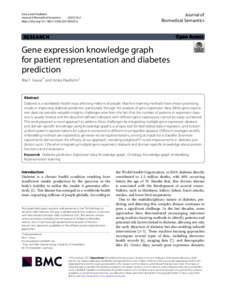|
Gene expression knowledge graph for patient representation and diabetes prediction
Sousa, Rita T.
;
Paulheim, Heiko
![[img]](https://madoc.bib.uni-mannheim.de/69375/1.hassmallThumbnailVersion/s13326-025-00325-6.pdf)  Vorschau |
|
PDF
s13326-025-00325-6.pdf
- Veröffentlichte Version
Download (2MB)
|
|
DOI:
|
https://doi.org/10.1186/s13326-025-00325-6
|
|
URL:
|
https://jbiomedsem.biomedcentral.com/articles/10.1...
|
|
URN:
|
urn:nbn:de:bsz:180-madoc-693755
|
|
Dokumenttyp:
|
Zeitschriftenartikel
|
|
Erscheinungsjahr:
|
2025
|
|
Titel einer Zeitschrift oder einer Reihe:
|
Journal of Biomedical Semantics
|
|
Band/Volume:
|
16
|
|
Heft/Issue:
|
Article 2
|
|
Seitenbereich:
|
1-16
|
|
Ort der Veröffentlichung:
|
London
|
|
Verlag:
|
BioMed Central
|
|
ISSN:
|
2041-1480
|
|
Sprache der Veröffentlichung:
|
Englisch
|
|
Einrichtung:
|
Fakultät für Wirtschaftsinformatik und Wirtschaftsmathematik > Data Science (Paulheim 2018-)
|
|
Bereits vorhandene Lizenz:
|
 Creative Commons Namensnennung 4.0 International (CC BY 4.0) Creative Commons Namensnennung 4.0 International (CC BY 4.0)
|
|
Fachgebiet:
|
610 Medizin, Gesundheit
|
|
Freie Schlagwörter (Englisch):
|
diabetes prediction , expression data , Knowledge graph , ontology , knowledge graph embedding , representation learning
|
|
Abstract:
|
Diabetes is a worldwide health issue affecting millions of people. Machine learning methods have shown promising results in improving diabetes prediction, particularly through the analysis of gene expression data. While gene expression data can provide valuable insights, challenges arise from the fact that the number of patients in expression datasets is usually limited, and the data from different datasets with different gene expressions cannot be easily combined. This work proposes a novel approach to address these challenges by integrating multiple gene expression datasets and domain-specific knowledge using knowledge graphs, a unique tool for biomedical data integration, and to learn uniform patient representations for subjects contained in different incompatible datasets. Different strategies and KG embedding methods are explored to generate vector representations, serving as inputs for a classifier. Extensive experiments demonstrate the efficacy of our approach, revealing weighted F1-score improvements in diabetes prediction up to 13% when integrating multiple gene expression datasets and domain-specific knowledge about protein functions and interactions.
|
 | Dieser Eintrag ist Teil der Universitätsbibliographie. |
 | Das Dokument wird vom Publikationsserver der Universitätsbibliothek Mannheim bereitgestellt. |
 Suche Autoren in Suche Autoren in
Sie haben einen Fehler gefunden? Teilen Sie uns Ihren Korrekturwunsch bitte hier mit: E-Mail
Actions (login required)
 |
Eintrag anzeigen |
|
|
 ORCID: 0000-0002-7241-8970 ; Paulheim, Heiko
ORCID: 0000-0002-7241-8970 ; Paulheim, Heiko  ORCID: 0000-0003-4386-8195
ORCID: 0000-0003-4386-8195



 Creative Commons Namensnennung 4.0 International (CC BY 4.0)
Creative Commons Namensnennung 4.0 International (CC BY 4.0) Suche Autoren in
Suche Autoren in